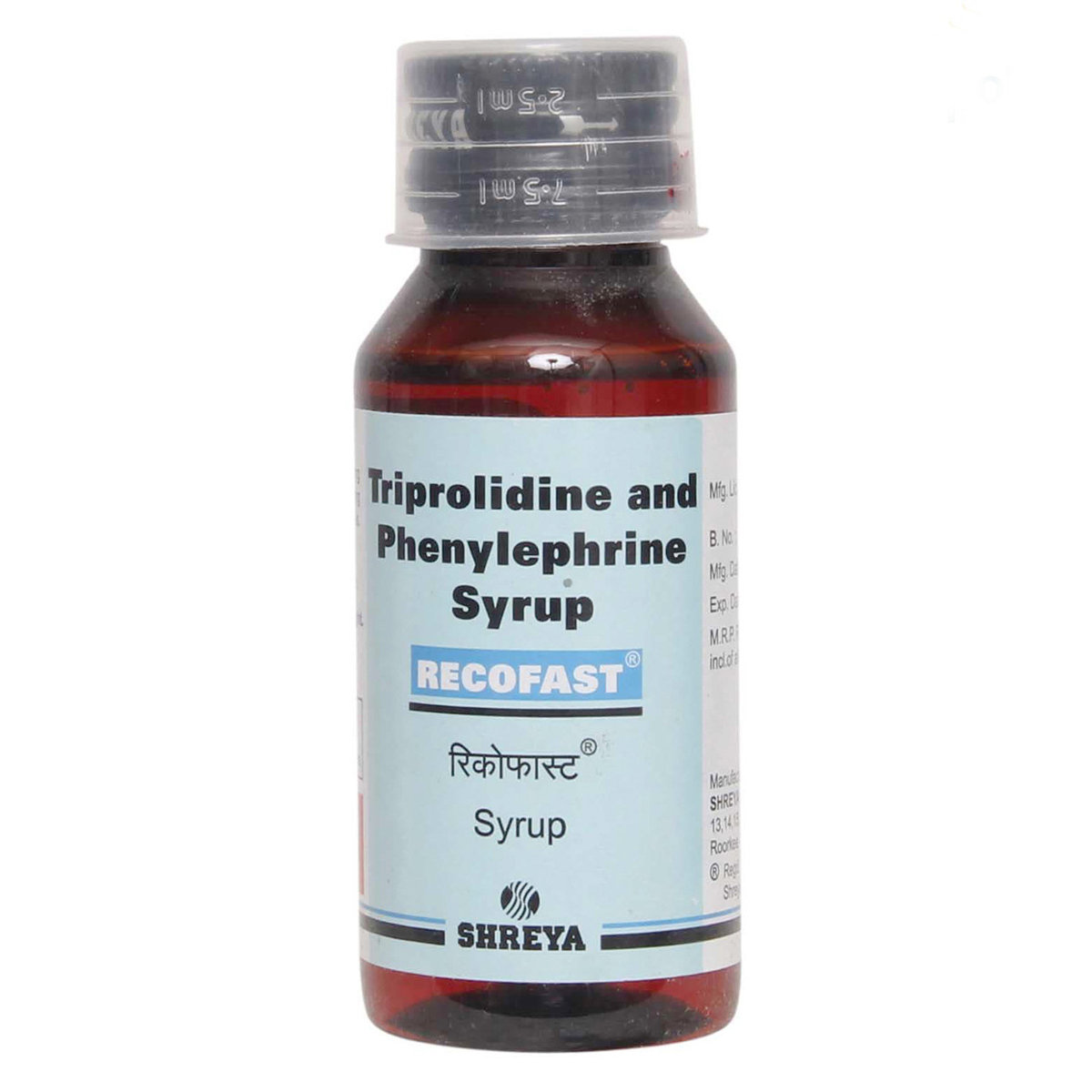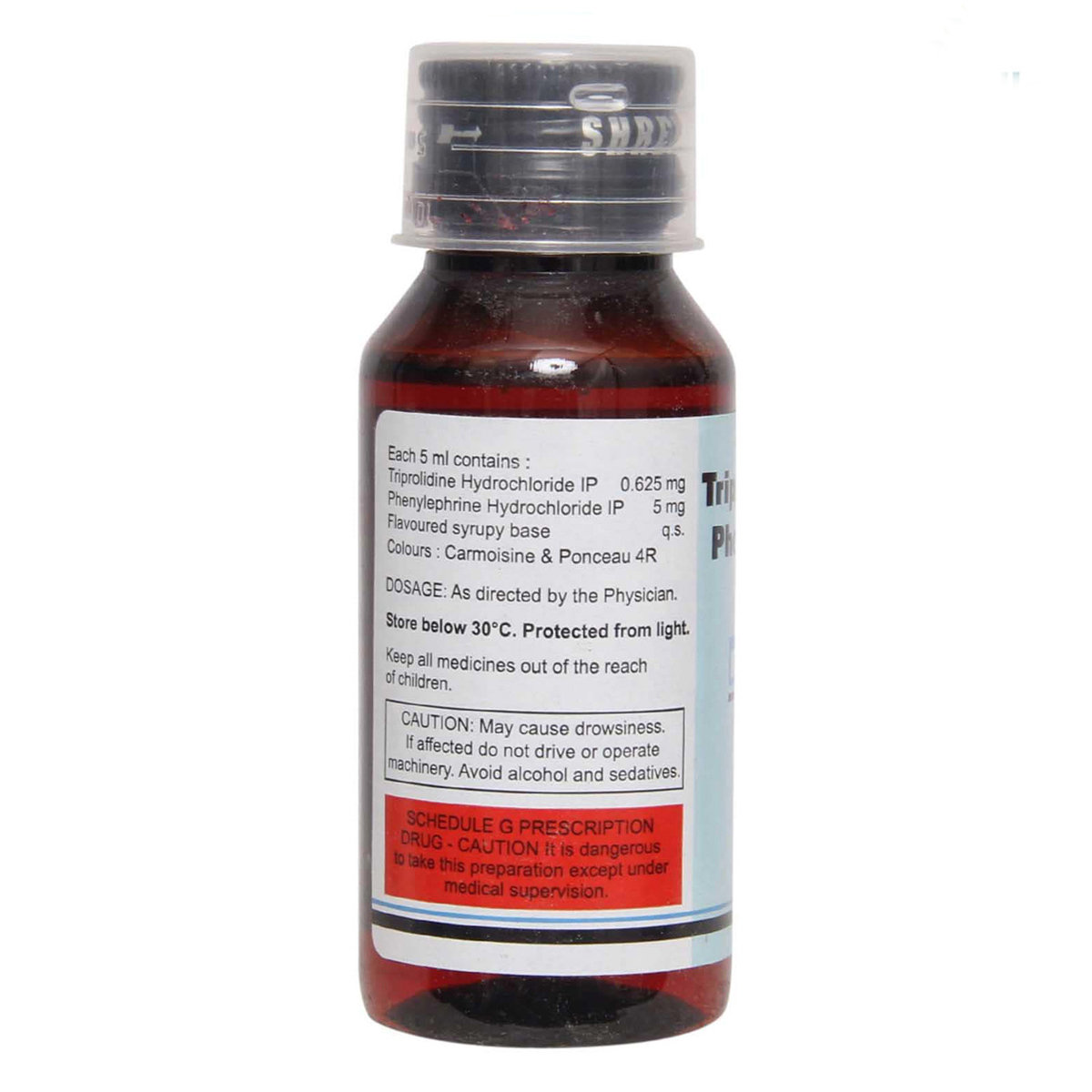Recofast Syrup 60 ml
MRP ₹102.5
(Inclusive of all Taxes)
₹15.4 Cashback (15%)
Provide Delivery Location
Online payment accepted
 Prescription drug
Prescription drugWhats That
Composition :
Manufacturer/Marketer :
Consume Type :
Expires on or after :
Return Policy :
About Recofast Syrup
Recofast Syrup belongs to the class of medications called ‘cough and cold preparations’ used to treat the common cold and allergic symptoms such as a runny nose, sneezing, itchy or watery eyes, and blocked nose. The common cold is an infection of the nose and throat caused by viruses. Allergies are immune system reactions to foreign bodies or allergens such as certain foods, chemicals, pet dander, or pollen.
Recofast Syrup is a combination of two medicines: Triprolidine and Phenylephrine. Triprolidine belongs to the class of antihistamines (anti-allergic drugs) that works by blocking the action of histamine, a substance responsible for causing allergic reactions. Phenylephrine is a decongestant that works by contracting and narrowing the blood vessels of nasal passage and airways.
You should take this medicine as prescribed by your doctor. The common side-effects of Recofast Syrup are dizziness, drowsiness, nervousness, and trouble sleeping. These side-effects are usually mild and don’t require medical attention. However, consult your doctor immediately if any of these side-effects persist or get worsen.
Do not use Recofast Syrup if you are allergic to Triprolidine, Phenylephrine, or any other contents in it. Recofast Syrup is not recommended for use in patients suffering from constipation, inability to urinate, stomach blockage, uncontrolled asthma, glaucoma (increased pressure in the eye), high blood pressure, heart diseases, or hyperthyroidism (overactive thyroid). Do not take Recofast Syrup if you have taken MAO inhibitors (antidepressants) in the last 14 days. Inform your doctor if you are pregnant or breastfeeding before starting Recofast Syrup.
Uses of Recofast Syrup
Directions for Use
Key Benefits
Recofast Syrup is a combination of two medicines: Triprolidine and Phenylephrine. Triprolidine is an antihistamine (anti-allergic drug) that works by blocking histamine, a substance responsible for causing allergic reactions. It also provides relief from allergy symptoms such as sneezing, running nose, watery eyes, itching, swelling, congestion, or stiffness. Phenylephrine is a decongestant that works by contracting and narrowing the blood vessels of nasal passage and airways.
Storage
Drug Warnings
Recofast Syrup should be used with caution in patients with breathing problems, diabetes, glaucoma (increased pressure in the eye), heart problems, hypertension (high blood pressure), kidney problems, liver disease, seizures (fits), stomach blockage, hyperthyroidism (overactive thyroid), and an enlarged prostate gland (difficulty urinating). Recofast Syrup may cause drowsiness, so do not take alcohol as it causes excessive drowsiness. Also, do not drive or operate heavy machinery if you are drowsy. It should be used with caution in children and elderly patients as they are more prone to side-effects. Do not take Recofast Syrup if you have taken antidepressants or medicines to treat Parkinson’s disease in the last 14 days.
Drug-Drug Interactions
Drug-Drug Interactions
Login/Sign Up
Taking Recofast Syrup 60 ml with Propofol may lead to increased levels of Recofast Syrup 60 ml leading to side effects like high blood pressure.
How to manage the interaction:
Taking Recofast Syrup 60 ml with Propofol is not recommended, but it can be taken if prescribed by the doctor. Do not discontinue the medications without consulting a doctor.
Taking Furazolidone with Recofast Syrup 60 ml can cause an increase in high blood pressure.
How to manage the interaction:
Taking Furazolidone with Recofast Syrup 60 ml is not recommended, it can be taken if prescribed by the doctor. However, if you experience sudden and severe headache, blurred vision, confusion, seizures, chest pain, nausea or vomiting, sweating, lightheadedness, fainting, sudden numbness or weakness (especially on one side of the body), speech difficulties, fever, consult the doctor immediately. It is advised to use Recofast Syrup 60 ml only after 14 days of stopping Furazolidone.
Taking Tranylcypromine with Recofast Syrup 60 ml can increase the risk of high blood pressure.
How to manage the interaction:
Taking Tranylcypromine with Recofast Syrup 60 ml is not recommended, but can be taken together if prescribed by a doctor. However, consult a doctor if you experience severe headache, blurred vision, confusion, seizures, chest pain, nausea or vomiting, sudden numbness or weakness (especially on one side of the body), speech difficulties, fever, sweating, lightheadedness, and fainting Do not discontinue any medications without consulting a doctor.
Co-administration of Recofast Syrup 60 ml with Sevoflurane can increase the levels of Recofast Syrup 60 ml and lead to side effects.
How to manage the interaction:
Taking Recofast Syrup 60 ml with Sevoflurane is not recommended, it can be taken if prescribed by the doctor. Do not discontinue the medications without consulting a doctor.
Co-administration of Selegiline with Recofast Syrup 60 ml together can raise blood pressure.
How to manage the interaction:
Taking Selegiline with Recofast Syrup 60 ml is not recommended, it can be taken together if prescribed by a doctor. However, consult a doctor immediately if you experience any symptoms such as severe headache, blurred vision, confusion, fits, chest pain, nausea or vomiting, sudden numbness or weakness (especially on one side of the body), speech difficulties, fever, sweating, lightheadedness, and/or fainting Do not discontinue any medications without consulting a doctor.
Taking Recofast Syrup 60 ml and Potassium citrate (in tablet or capsule form) together can increase the risk of stomach ulcers, bleeding, and gastrointestinal injury.
How to manage the interaction:
Taking Recofast Syrup 60 ml with Potassium citrate is not recommended, as it may lead to an interaction, it can be taken if prescribed by the doctor. However, if you experience severe stomach pain, bloating, sudden lightheadedness or dizziness, nausea, vomiting (especially with blood), decreased hunger, or dark, tarry stools, consult the doctor immediately. Do not discontinue any medications without a doctor's advice.
Co-administration of Amoxapine and Recofast Syrup 60 ml together may lead to side effects like increased blood pressure.
How to manage the interaction:
Taking Recofast Syrup 60 ml and Amoxapine together can result in an interaction, it can be taken if a doctor has advised it. However, if you experience any unusual symptoms, consult the doctor. It is advised to maintain blood pressure. Do not discontinue any medications without a doctor's advice.
Taking Doxepin and Recofast Syrup 60 ml together may lead to side effects like increased blood pressure.
How to manage the interaction:
Although taking Doxepin and Recofast Syrup 60 ml together can result in an interaction, it can be taken if a doctor has prescribed it. However, if you experience any symptoms, contact your doctor immediately. Regular monitoring of blood pressure is advised. Do not discontinue any medications without a doctor's advice.
Taking Recofast Syrup 60 ml with Methylergometrine can led to side effects like increased blood pressure.
How to manage the interaction:
Taking Recofast Syrup 60 ml with Methylergometrine can lead to an interaction but can be taken if prescribed by the doctor. It is advised to monitor your blood pressure regularly. Do not discontinue any medications without a doctor's advice.
Co-administration of Amitriptyline with Recofast Syrup 60 ml together may lead to side effects like increased blood pressure.
How to manage the interaction:
Recofast Syrup 60 ml and amitriptyline could interact, but they can still be taken if they are prescribed by a doctor. It is advised to monitor blood pressure regularly. Without consulting a doctor, never stop taking any medications.
Drug-Food Interactions
Drug-Food Interactions
Login/Sign Up
Diet & Lifestyle Advise
- Staying hydrated is vital for those with a cough or cold. Drinking liquids at room temperature can alleviate cough, runny nose, and sneezing.
- The immune system is affected by stress and raises the risk of being sick. An individual can exercise regularly, meditate, do deep breathing, and try progressive muscle relaxation techniques to relieve stress.
- To stay fit and safe, try to sleep at least 8 hours each night.
- It is advised to avoid contact with known allergens (allergy-causing agents) such as pollen, dust, etc. Certain food items are known to cause allergies to you.
- Maintain personal hygiene and keep your surroundings clean.
Side Effects of Recofast Syrup
- Dizziness
- Drowsiness
- Nervousness
- Trouble sleeping
- Tremor, seizure (convulsions)
- Fast or uneven heart rate
- Mood changes
Habit Forming
Therapeutic Class
All Substitutes & Brand Comparisons
Drug-Diseases Interactions
Drug-Diseases Interactions
Login/Sign Up
FAQs
Recofast Syrup is a combination of two medicines: Triprolidine and Phenylephrine. Triprolidine blocks histamine's action (cause allergic reactions) and Phenylephrine reduces swelling of the blood vessels in the nasal passages. Together, Recofast Syrup can effectively treat symptoms of allergy and the common cold.
Recofast Syrup should not be used if you have taken antidepressants in the last 14 days. Inform your doctor about all the prescription, non-prescription, and dietary supplements you are taking to identify any interactions with the Recofast Syrup.
Recofast Syrup should not be used in patients with uncontrolled asthma, who commonly experience flare-ups and require quick-relief medication many times in a week or daily.
Recofast Syrup may cause drowsiness (sleepiness). So, you can take Recofast Syrup in the nighttime if you are experiencing severe drowsiness. If you are drowsy, you should refrain from activities that require you to stay alert, such as driving or operating heavy machinery.
Do not use Recofast Syrup with cetirizine as it increases the side-effects such as dizziness, and drowsiness. It may also affect your ability to concentrate, thinking, and judgment.
Drug-Drug Interactions Checker List
- CETIRIZINE
- DIPHENHYDRAMINE
- GUANETHIDINE
- METHYLDOPA
- ATENOLOL
- NIFEDIPINE
- ISOCARBOXAZID
- LINEZOLID
- METHYLENE BLUE
- MOCLOBEMIDE
- PHENELZINE
- PROCARBAZINE
- RASAGILINE
- SAFINAMIDE
- SELEGILINE
- TRANYLCYPROMINE
- CODEINE
- HYDROCODONE
- ALPRAZOLAM
- LORAZEPAM
- ZOLPIDEM
- CARISOPRODOL
- CYCLOBENZAPRINE
Special Advise
Recofast Syrup may interfere with certain laboratory tests such as brain scan for Parkinson's disease and urine drug screening tests, leading to false test results. So, inform your doctor that you are using this medicine before undergoing the tests.
Disease/Condition Glossary
Common cold: The common cold is an infection caused by viruses, mainly 'rhinovirus' affecting your nose and throat (upper respiratory tract). Children younger than 6 years of age are at the most significant risk of colds, but healthy adults can also be affected to have 2-3 colds annually. In most cases, cold symptoms are recovered within a week or ten days. However, symptoms might last longer in people who smoke or are exposed to allergens like dust, pollutants, etc. Common cold symptoms include stuffy or runny nose, sore throat, cough, congestion, mild body pain, mild headache, sneezing, low-grade fever, and feeling unwell (malaise). In some cases, the discharge from your nose may become thicker and yellow or green, which is not an indication of a bacterial infection. If you observe these symptoms, immediately contact your doctor.
Allergies: Allergy occurs when foreign elements or allergens attack and invade our body, stimulating the immune system to release histamines. Histamines are chemical substances that cause symptoms such as swelling, inflammation, redness, itchiness, itchy/watery nose and throat, and watery eyes. Allergies generally occur due to chemicals, air pollution, pet danders, dust, pollen hairs, seasonal allergies like hay fever, etc.

Have a query?
Alcohol
Safe if prescribed
Alcohol consumption may increase the risk of side-effects.
Pregnancy
Consult your doctor
Recofast Syrup is a category C medicine. When clinically needed, Recofast Syrup is given to pregnant women after doing a risk/benefit assessment.
Breast Feeding
Consult your doctor
Recofast Syrup should be used with caution in breastfeeding mothers.
Driving
Safe if prescribed
Recofast Syrup may cause drowsiness. So, avoid driving or operating heavy machinery while using this medicine if you are drowsy.
Liver
Consult your doctor
Recofast Syrup should be used with caution in patients with liver diseases. Dose adjustments may be necessary.
Kidney
Consult your doctor
Recofast Syrup should be used with caution in patients with kidney diseases. Dose adjustments may be necessary.
Children
Safe if prescribed
Recofast Syrup should be used with caution in children as they are more prone to side-effects.







